Letter from Arthur Seaforth Blackburn to his family, 1941 - Part 2 of 3
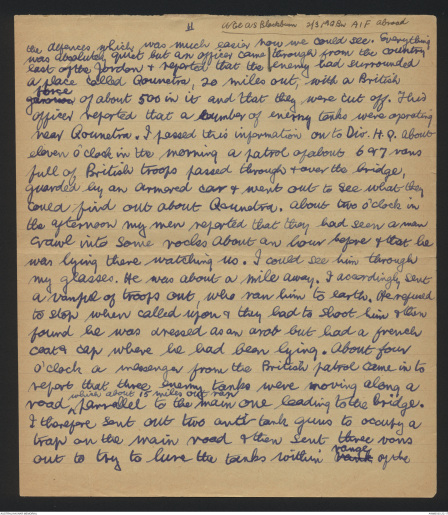
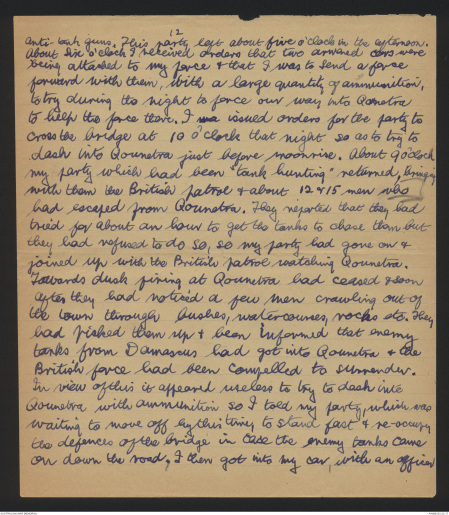
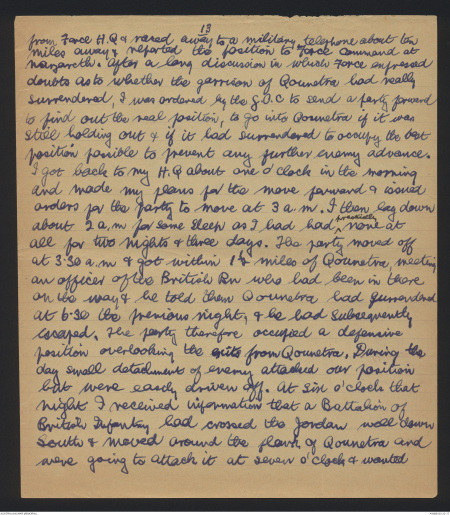
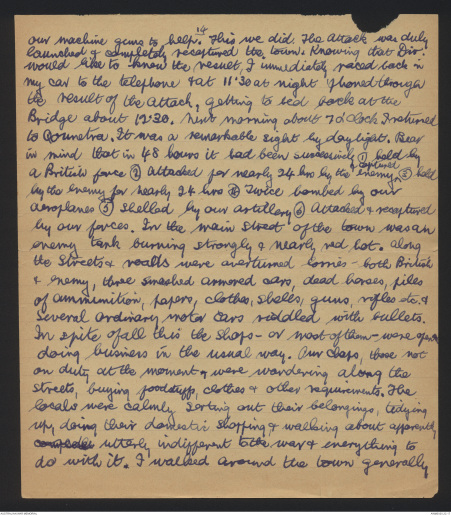
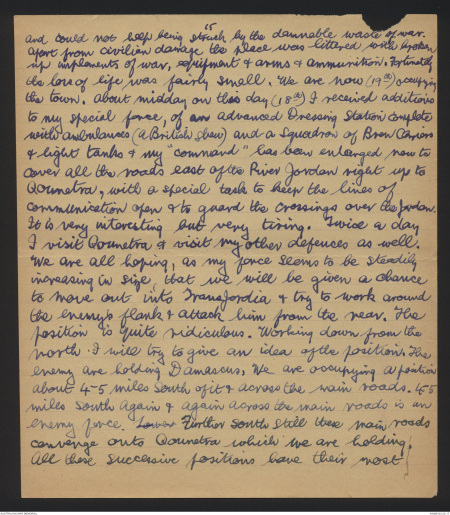
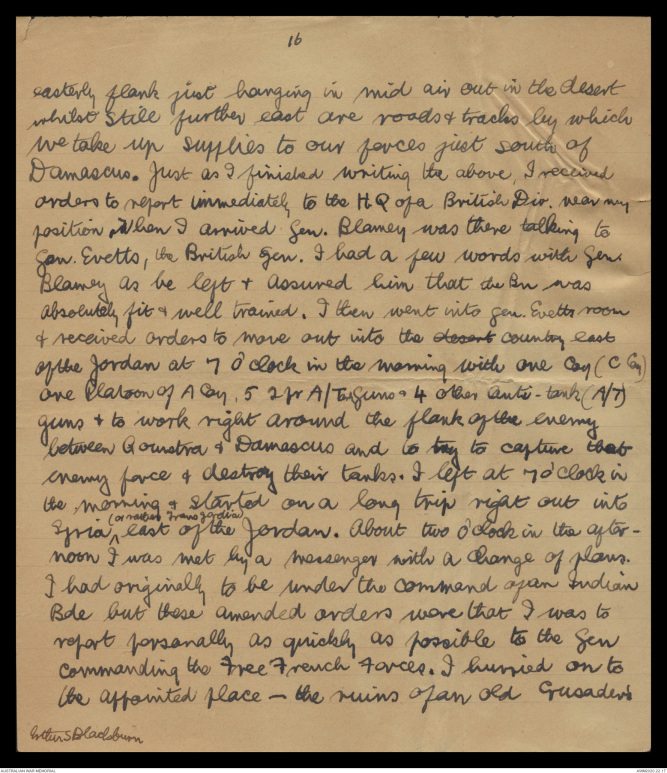
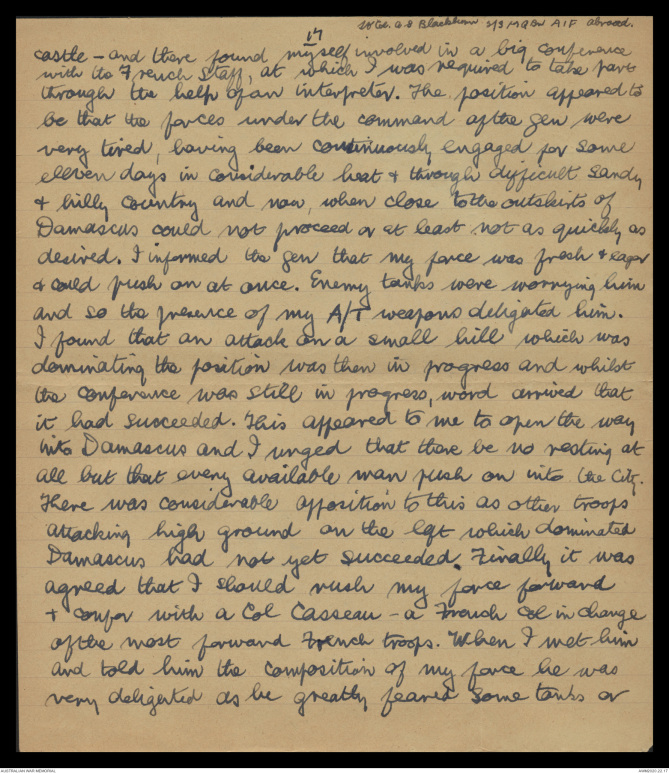
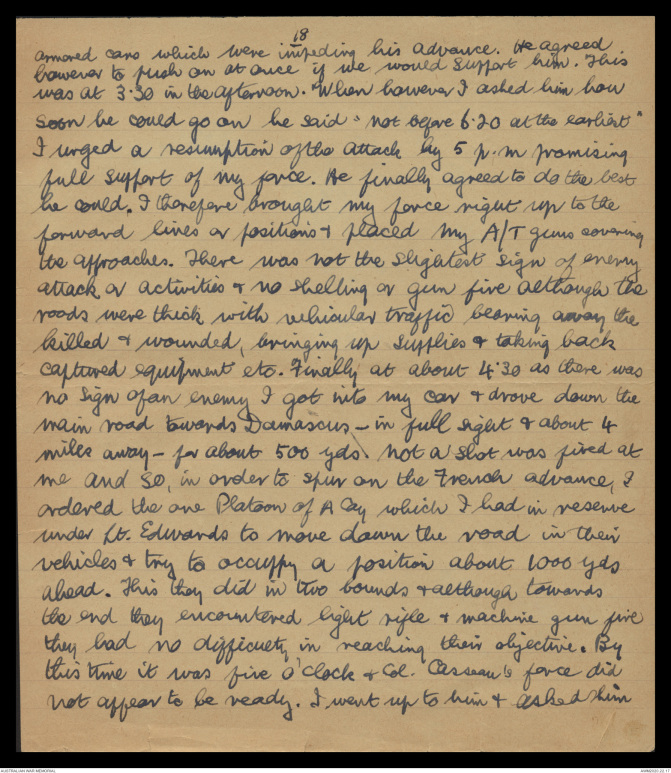
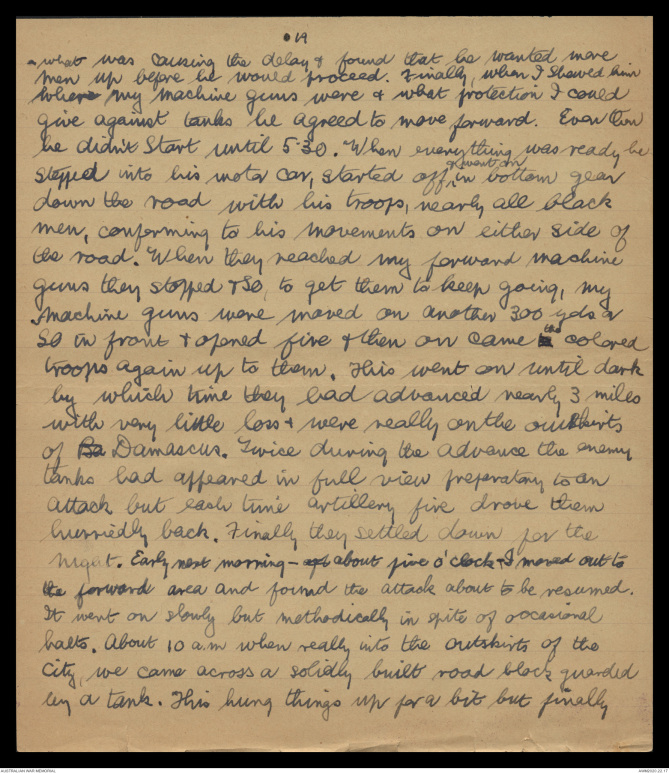
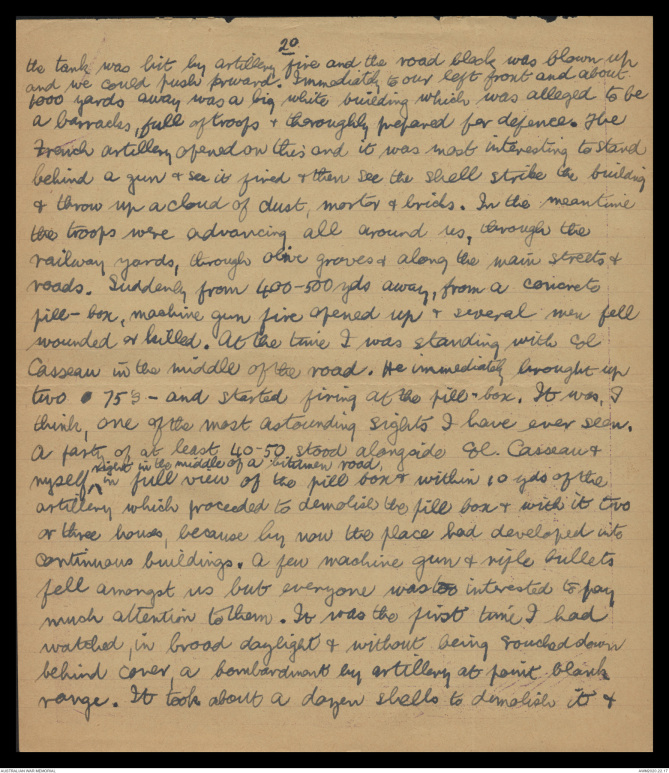
11 Lt Col AS Blackburn 2/3 MGBn AIF abroad
the defences which was much easier now we could see. Everything
was absolutely quiet but an officer came through from the country
east of the Jordon & reported that the enemy had surrounded
a place called Qounetra, 20 miles out, with a British garisson force of about 500 in it and that they were cut off. This
officer reported that a member of enemy tanks were oprating
near Qounetra. I passed this information on to Div. H.Q. about
eleven o'clock in the morning a patrol of about 6 or 7 vans
full of British troops passed through & over the bridge,
guarded by an armored car & went out to see what they
could find out about Qounetra. About two o'clock in
the afternoon my men reported that they had seen a man
crawl into some rocks about an hour before & that he
was lying there watching us. I could see him through
my glasses. He was about a mile away. I accordingly sent
a vanful of troops out, who ran him to earth. He refused
to stop when called upon & they had to shoot him & then
found he was dressed as an Arab but had a French
coat & cap where he had been lying. About four
o'clock a messenger from the British patrol came in to
report that three enemy tanks were moving along a
road, which about 15 miles out ran parrallel to the main one leading to the bridge.
I therefore sent out two anti-tank guns to occupy a
trap on the main road & then sent three vans
out to try to lure the tanks within rank range of the
12
anti- tank guns. This party left about five o'clock in the afternoon.
About six o'clock I received orders that two armored cars were
being attached to my force & that I was to send a force
forward with them, with a large quantity of ammunition,
to try during the night to force our way into Qounetra
to help the force there. I wa was issued orders for the party to
cross the bridge at 10 o'clock that night so as to try to
dash into Qounetra just before moonrise. About 9 o'clock
my party which had been "tank hunting" returned, bringing
with them the British patrol & about 12 or 15 men who
had escaped from Qounetra. They reported that they had
tried for about an hour to get the tanks to chase them but
they had refused to do so, so my party had gone on &
joined up with the British patrol watching Qounetra.
Towards dusk firing at Qounetra had ceased & soon
after they had noticed a few men crawling out of
the town through bushes, watercourses, rocks etc. They
had picked them up & been informed that enemy
tanks from Damascus had got into Qounetra & the
British force had been compelled to surrender.
In view of this it appeared useless to try to dash into
Qounetra with ammunition so I told my party, which was
waiting to move off by this time, to stand fast & re-occupy
the defences of the bridge in case the enemy tanks came
on down the road. I then got into my car, with an officer
13
from Force H.Q & raced away to a military telephone about ten
miles away & reported the position to Force Command at
Nazareth. After a long discussion in which Force expressed
doubt as to whether the garrison of Qounetra had really
surrendered, I was ordered by the G.O.C to send a party forward
to find out the real position, to go into Qounetra if it was
still holding out & if it had surrendered to occupy the best
position possible to prevent any further enemy advance.
I got back to my H.Q about one o'clock in the morning
and made my plans for the move forward & issued
orders for the party of move at 3 a.m. I then lay down
about 2 a.m. for some sleep as I had had practically none at
all for two nights & three days. The party moved off
at 3.30 a.m. & got within 1½ miles of Qounetra, meeting
an officer of the British Bn who had been in there
on the way & he told them Qounetra had surrendered
at 6.30 the previous night, & he had subsequently
escaped. The party therefore occupied a defensive
position overlooking the exits from Qounetra. During the
day small detachment of enemy attacked our position
but were easily driven off. At six o'clock that
night I received information that a Battalion of British Infantry had crossed
the Jordan well down South & moved around the flank of Qounetra and
were going to attack it at seven o'clock & wanted
14
our machine guns to help. This we did. The attack was duly
launched & completely recaptured the town. Knowing that Div.
would like to know the result, I immediately raced back in
my car to the telephone & at 11.30 at night 'phoned through
the result of the attack, getting to bed back at the
Bridge about 12.30. Next morning about 7 o'clock I returned
to Qounetra. It was a remarkable sight by daylight. Bear
in mind that in 48 hours it had been successively (1) held by
a British force (2) Attacked for nearly 24 hrs by the enemy & captured (3) held
by the enemy for nearly 24 hrs (4) Twice bombed by our
aeroplanes (5) shelled by our artillery (6) attacked & recaptured
by our forces. In the main street of the town was an
enemy tank burning strongly & nearly red hot. Along
the Streets & roads were overturned lorries - both British
& enemy, three smashed armored cars, dead horses, piles
of ammunition, papers, clothes, shells, guns, rifles etc. &
several ordinary motor cars riddled with bullets.
In spite of all this the shops - or most of them - were open &
doing business in the usual way. Our chaps, those not
on duty at the moment, were wandering along the
streets, buying foodstuffs, clothes & other requirements. The
locals were calmly sorting out their belongings, tidying
up, doing their domestic shopping & walking about apparently comple utterly indifferent to the war & everything to
do with it. I walked around the town generally
15
and could not keep being struck by the damnable waste of war.
Apart from civilian damage the place was littered with broken
up implements of war, equipment & arms & ammunition. Fortunately
the loss of life was fairly small. We are now (19th) occupying
the town. About midday on this day (18th) I received additions
to my special force, of an advanced Dressing Station complete
with ambulances (a British show) and a Squadron of Bren Carriers
& light tanks & my "command" has been enlarged now to
cover all the roads east of the River Jordan right up to
Qounetra, with a special task to keep the lines of
communication open & to guard the crossings over the Jordon.
It is very interesting but very tiring. Twice a day
I visit Qounetra & visit my other defences as well.
We are all hoping, as my force seems to be steadily
increasing in size, that we will be given a chance
to move out into Trans Jordia & try to work around
the enemy's flank & attack him from the rear. The
position is quite ridiculous. Working down from the
north I will try to give an idea of the position. The
enemy are holding Damascus. We are occupying a position
about 4-5 miles South of it & across the main roads. 4-5
miles south again & again across the main roads is an
enemy force. Lower Further south still these main roads
converge onto Qounetra which we are holding.
All these successive positions have their most
16
easterly flank just hanging in mid air out in the desert
whilst still further east are roads & tracks by which
we take up supplies to our forces just south of
Damascus. Just as I finished writing the above, I received
orders to report immediately to the H.Q of a British Div. near my
position. When I arrived Gen. Blamey was there talking to
Gen. Evetts the British Gen. I had a few words with Gen
Blamey as he left & assured him that the Bn was
absolutely fit & well trained. I then went into Gen. Evetts room
& received orders to move out into the desert country east
of the Jordan at 7 o'clock in the morning with on Coy (C Coy)
one Platoon of A Coy, 5 2 pr A/TomGuns & 4 other Anti-Tank (A/T)
guns & to work right around the flank of the enemy
between Qounetra & Damascus and to try to capture that
enemy force & destroy their tanks. I left at 7 o'clock in
the morning & started on a long trip right out into
Syria (or rather Trans Jordia) east of Jordan. About two o'clock in the after-
noon I was met by a messenger with a change of plans.
I had originally to be under the command of an Indian
Bde but these amended orders were that I was to
report personally as quickly as possible to the Gen
commanding the Free French Forces. I hurried on to
the appointed place - the ruins of an old Crusader's
Arthur S Blackburn
Lt Col A.S. Blackburn 2/3 MG Bn AIF abroad.
17
castle - and there found myself involved in a big conference
with its French Staff, at which I was required to take part
through the help of an interpreter. The position appeared to
be that the forces under the command of the Gen were
very tired, having been continuously engaged for some
eleven days in considerable heat & through difficult sandy
& hilly country and now, when close to the outskirts of
Damascus could not proceed or at least not as quickly as
desired. I informed the Gen that my force was fresh & eager
& could push on at once. Enemy tanks were worrying him
and so the presence of my A/T weapons delighted him.
I found that an attack on a small hill which was
dominating the position was then in progress and whilst
the Conference was still in progress, word arrived that
it had succeeded. This appeared to me to open the way
into Damascus and I urged that there be no resting at
all but that every available man push into the City.
There was considerable opposition to this as other troops
attacking high ground on the left which dominated
Damascus had not yet succeeded. Finally it was
agreed that I should rush my force forward
& confer with a Col Casseau - a French Col in charge
of the most forward French troops. When I met him
and told him the composition of my force he was
very delighted as he greatly feared some tanks or
18
armored cars which were impeding his advance. He agreed
however to push on at once if we would support him. This
was at 3.30 in the afternoon. When however I asked him how
soon he could go on he said "not before 6.20 at the earliest"
I urged a resumption of the attack by 5 p.m. promising
full support of my force. He finally agreed to do the best
he could. I therefore brought my force right up to the
forward lines or positions & place my A/T guns covering
the approaches. There was not the slightest sign of enemy
attack or activities & no shelling or gun fire although the
roads were thick with vehicular traffic bearing away the
killed & wounded, bringing up supplies & taking back
captured equipment etc. Finally at about 4.30 as there was
no sign of an enemy I got into my car & drove down the
main road towards Damascus - in full sight & about 4
miles away - for about 500 yds. Not a shot was fired at
me and so, in order to spur on the French advance, I
ordered the one Platoon of A Coy which I had in reserve
under Lt. Edwards to move down the road in their
vehicles & to try to occuppy a position about 1000 yds
ahead. This they did in two bounds & although towards
the end they encountered light rifle & machine gun fire
they had no difficulty in reaching their objective. By
this time it was five o'clock & Col. Casseau's force
did not appear to be ready. I went up to him & asked him
19
what was causing the delay & found that he wanted more
men up before he would proceed. Finally, when I showed him
where my machine guns were & what protection I could
give against tanks he agreed to move forward. Even then
he didn't start until 5.30. When everything was ready he
stepped into his motor car, started off & went on in bottom gear
down the road with his troops nearly all black
men, conforming to his movements on either side of
the road. When they reached my forward machine
guns they stopped & so to get them to keep going, my
machine guns were moved on another 300 yds or
so in front & opened fire & then on came the colored
troops again up to them. This went on until dark
by which time they had advanced nearly 3 miles
with very little loss & were really on the outskirts
of Ba Damascus. Twice during the advance the enemy
tanks had appeared in full view preparatory to an
attack but each time artillery fire drove them
hurriedly back. Finally they settled down for the
night. Early next morning - apl about five o'clock - I moved out to
the forward area and found the attack about to be resumed.
It went on slowly but methodically in spite of occasional
halts. About 10 a.m when really into the outskirts of the
City, we came across a solidly built road block guarded
by a tank. This hung things up for a bit but finally
20
the tank was hit by artillery fire and the road block was blown up
and we could push forward. Immediately to our left front and about
1000 yards away was a big white building which was alleged to be
a barracks, full of troops & thoroughly prepared for defence. The
French artillery opened on this and it was most interesting to stand
behind a gun & see it fired & then see the shell strike the building
& throw up a cloud of dust, mortar & bricks. In the meantime
the troops were advancing all around us, through the
railway yards, through olive groves & along the main streets &
roads. Suddenly from 400-500 yds away, from a concrete
pill-box, machine gun fire opened up & several men fell
wounded or killed. At the time I was standing with Col
Casseau in the middle of the road. He immediately brought up
two .75's - and started firing at the pill-box. It was, I
think, one of the most astounding sights I have ever seen.
A party of at least 40-50 stood alongside Col Casseau &
myself right in the middle of a bitumen road, in full view of the pill box & within 10 yds of the
artillery which proceeded to demolish the pill box & with it two
or three houses, because by now the place had developed into
continuous buildings. A few machine gun & rifle bullets
fell amongst us but everyone was too interested to pay
much attention to them. It was the first time I had
watched, in broad daylight & without being crouched down
behind cover, a bombardment by artillery at point blank
range. It took about a dozen shells to demolish it &
 Jacqueline Kennedy
Jacqueline KennedyThis transcription item is now locked to you for editing. To release the lock either Save your changes or Cancel.
This lock will be automatically released after 60 minutes of inactivity.